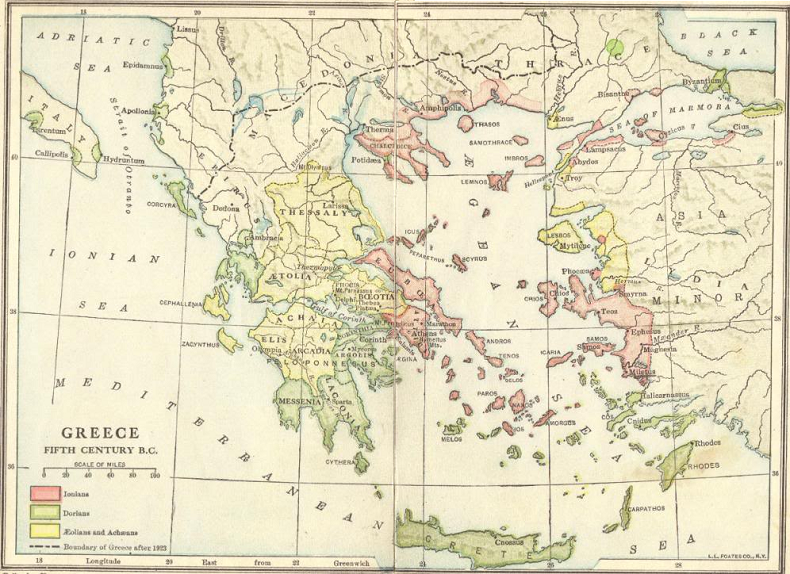| Fifth-Century B.C.E. Map of Greece |
|---|
| www.studenthandouts.com ↣ World History ↣ Ancient Greece ↣ Images of Ancient Greece |
Map of ancient classical Greece in the Fifth Century B.C.E.: Culturally-Greek peoples were common throughout the eastern Mediterranean, particularly in what is today the country of Turkey. The Greeks founded colonies throughout the region. Click here to enlarge. Classical Greece in the fifth century B.C.E. was a remarkable period of ancient Greek history marked by significant cultural, intellectual, political, and artistic achievements.
 Golden Age of Athens: The fifth century B.C.E. is often referred to as the "Golden Age of Athens" due to the city's cultural and political prominence. Under the leadership of Pericles, Athens flourished as a center of democracy, philosophy, and the arts.
Golden Age of Athens: The fifth century B.C.E. is often referred to as the "Golden Age of Athens" due to the city's cultural and political prominence. Under the leadership of Pericles, Athens flourished as a center of democracy, philosophy, and the arts.
Democracy: Athens was a pioneer in the development of democracy. The Athenian democracy was a direct democracy, where citizens had the right to participate in decision-making through the Assembly (Ekklesia), where they could vote on important issues. This was a relatively radical concept for the time. Intellectual Achievements: The fifth century B.C.E. saw a flowering of intellectual activity. It was the age of great philosophers such as Socrates, Plato, and Aristotle. These thinkers laid the foundations for Western philosophy. Herodotus, known as the "Father of History," wrote his Histories during this period. Drama and Theater: The classical period gave rise to Greek drama, with the playwrights Aeschylus, Sophocles, and Euripides creating masterpieces of tragedy. The theater played a central role in Greek culture and was a forum for exploring moral and ethical questions. Art and Architecture: The classical period also witnessed remarkable advancements in art and architecture. The Parthenon, a Doric temple on the Acropolis, is one of the most iconic structures of this era. Greek sculptors, including Phidias, produced exquisite statues and reliefs. Peloponnesian War: The fifth century B.C.E. was marked by the Peloponnesian War (431-404 B.C.E.), a protracted conflict between Athens and Sparta, the two most powerful city-states in Greece. The war had a profound impact on the region and eventually led to Athens' decline. Cultural Values: Ancient Greece in this era celebrated the values of excellence (arete) and balance. The Greek ideal of the "Golden Mean" emphasized moderation in all things, and these values were reflected in their art, philosophy, and ethical teachings. Literature: Greek literature saw significant achievements during this time, including the epics of Homer, such as the Iliad and the Odyssey. These works continued to be celebrated, and new literary forms, like historical writings and philosophical dialogues, emerged. Olympic Games: The ancient Olympic Games were a central sporting and cultural event in classical Greece. Held every four years in Olympia, these games attracted athletes from various city-states, fostering a sense of unity and competition. Slavery: While Athens celebrated democracy and intellectual achievements, it is essential to note that slavery was prevalent in classical Greece. Slaves were integral to the functioning of the city-state, and their labor supported the economic and cultural advancements. Classical Greece of the fifth century B.C.E. left a lasting legacy in many aspects of Western civilization, from the foundations of democracy and philosophy to art, literature, and architectural principles. It remains a pivotal period in the history of the ancient world. |
 |  |  |  |  |  |
| Ancient Greece Books and Films | Ancient Greece Outlines and PowerPoints |
| Ancient Greece Maps and Pictures | Ancient Greece Study Games |
| Ancient Greece Miscellany | Ancient Greece Worksheets |
| www.studenthandouts.com ↣ World History ↣ Ancient Greece ↣ Images of Ancient Greece |








